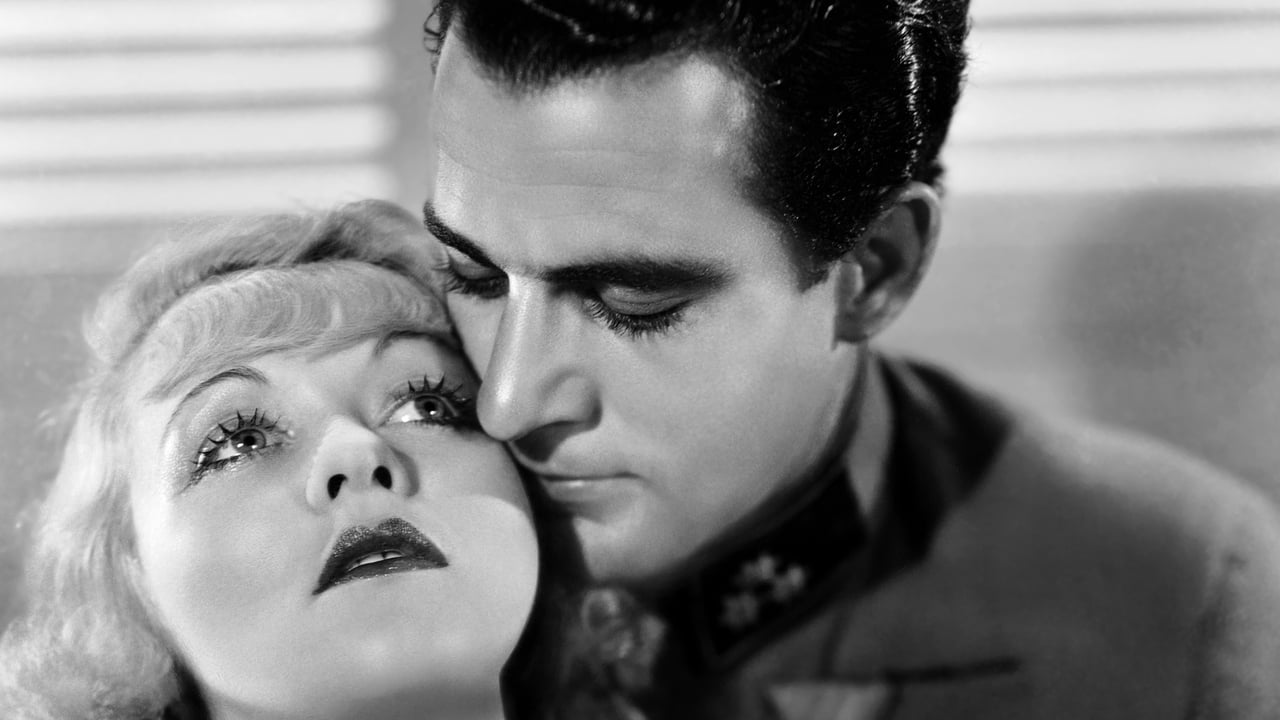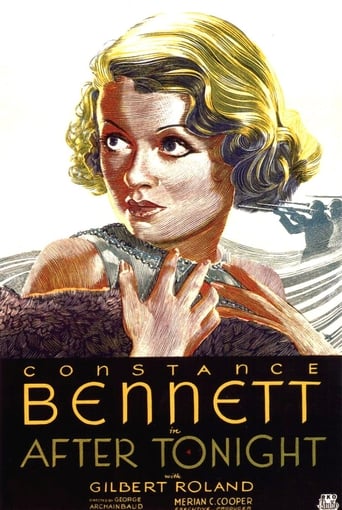

"After Tonight" is a rather heavy-handed and sappy love story--the type that, thankfully, died off a long time ago. Constance Bennett plays a Mata Hari-type woman. She's spying for the Russians during WWI and is posing as an Austrian nurse. Gilbert Roland plays an Austrian spy smasher--a guy whose job is to locate and liquidate spies like her. However, two VERY mismatched pair ends up falling in love. Now this is all a bit hard to believe and melodramatic, but it COULD have worked. However, at the end, when she is discovered, the film degenerates into a juvenile mess--where a silly tacked on happy ending occurs even though it defies logic and ruins the film with sickening sentimentality. Even if Bennett and Roland gave it their best, this poorly written film was destined to be a silly mess...which it is. If it sounds like I really, really hated the film, you are right--mostly because the ending left me feeling like I'd wasted my time.Incidentally, about a decade after this film, Bennett and Roland married. They didn't stay married, but they married.
... View MoreThis tale of espionage and high risk romance begins at a Paris railroad depot as Karen Schöntag, the Austrian alias of the Russian Carla Vanirska (Constance Bennett) attempts to board an overbooked train for Vienna.Well, as good fortune, perhaps, would have it, Captain Rudolph "Rudy" Ritter (Gilbert Roland), en route to Vienna himself, to his newly-promoted position as Captain of an Austrian intelligence agency, enables Karen/Carla to accompany him because he instantly succumbs to her charms and graces.Now, the balance of the film transpires in Vienna, as Rudy and Major Lieber (Edward Ellis) lead the search for the capture of the dangerous enemy agent "K-14," who cleverly delivers coded messages to comrades of a Russian insurgency movement to attempt to overthrow the government in Austria. (Well, keep in mind that this is a 1933 release, and before the period of WWII German occupation.) So, you may pretty well guess the identity of K-14 from the list of IMDb cast credits, but what a clever operator K-14 turns out to be, writing those secret coded messages in invisible ink, folding them into the pages of books, entering the secret rendezvous locations, tapping the steps of a staircase by the shoe, and delivering the set of books to a fellow agent, who hides beneath the staircase to slide a secret panel to receive them.Fans of the Classics may find many elements of manners, glamor and suspense, with the lovely leading lady carrying the film, all reasons to tune into vintage films. "After Tonight," well staged with excellent cinematography, does, however, seem to have a screen-story of conflicting allegiance for fans to wonder whom or what we're supposed to be rooting for here.According to IMDb, "The film lost $100,000 at the box office, which made the studio (RKO Radio Pictures) consider firing Miss Bennett," making her the scapegoat in an awkwardly scripted outing, which seems to loose its direction and climax in a rather somewhat implausible finale.But Constance Bennett does carry the film well, as its prime attraction, and she handles the material to cause even the more irate critics to care about her character--especially after bodies begin to fall victim to conflicts between the caucuses.So, in addition to Miss Bennett, Mr. Roland and Mr. Ellis, you may also recognize Sam Godfrey as Franz, Lucien Prival as Lieutenant Erlich, Mischa Auer as Agent Lehan, and Virginia Weidler in the role of Olga, Carla's Niece.And it would also be nice to score with half-points here and there.Edit 03/24/16 -- "...first sentence saying it begins in a Paris railroad station. It actually begins in Luxembourg, which is a different country and 250 miles away." -- (Thanks for correction, IMDb Member blakedw.)
... View MoreConstance Bennett was sublime in this. This film, unlike some others in which she starred, made it easy to see why she was a star. The plot is intriguing, if not overwhelmingly original, and the film is made very well. The theme song of the film, which Bennett sings (well), is memorable and sweet. Bennett is a glamour queen throughout and acts skillfully and pleasingly. The direction is overall excellent, the film moves at a brisk pace, and the sets and situations are not too stagy. It compares remarkably well to another spy melodrama of the period, Garbo's MATA HARI, and of the two, Bennett surprisingly comes out the winner (no disservice to the great Garbo intended, just some praise to the underrated and forgotten Bennett).
... View MoreLike Dietrich (Dishonored) and Garbo (Mata Hari) before her, Constance Bennett finally got a chance to play a fascinating spy in "After Tonight". This was Constance's last picture under her RKO contract. At the time of it's release the film was a failure and RKO laid the blame at the feet of Constance Bennett. Isn't it always better to lay the blame at the feet of the departing star? However, looking at it now, Miss Bennett is one of the saving graces of the picture. Her performance is actually quite good and the production is well put together. The direction is a little sluggish at times and Gilbert Roland (who would marry Constance in 1940) is a little wooden. The ending comes as no surprise, but it was exactly what female audiences of the time expected from "women's pictures". They would attend a matinée, watch the heroine suffer through six or seven reels and then be presented with a happy ending. (How things have changed.) While not great, this movie is not that bad. The movie belongs to Constance Bennett and anyone who is a fan of hers should add this to their watch list if they have not already done so.
... View More